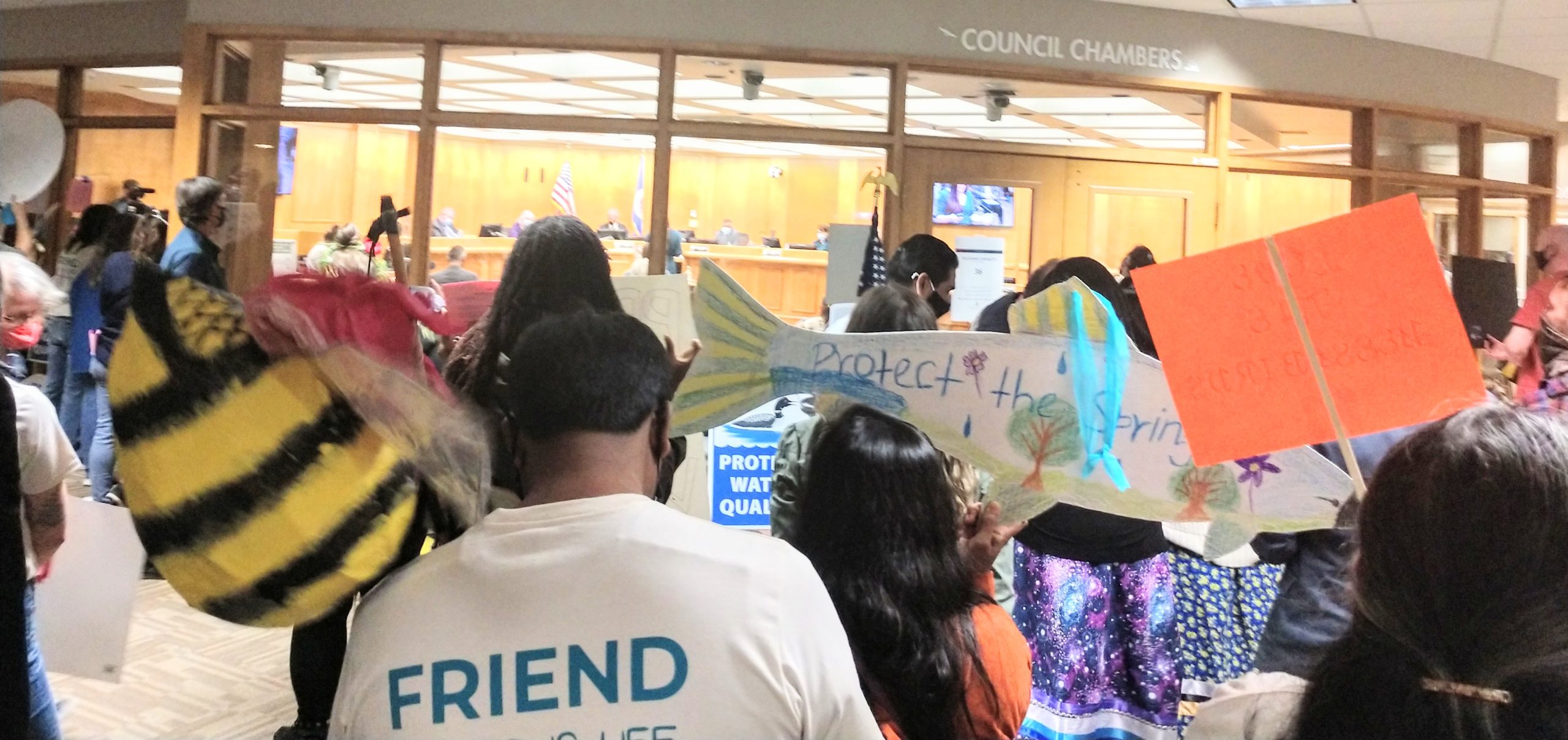After hearing from a developer and a geologist.
After testimony from a bee expert, a poet, a farmer, a precocious child, a pastor, a therapist, an attorney, and more.
After listening to folks from not only Eden Prairie but also Belle Plaine, Blaine, Burnsville, “Dakota Territory,” Excelsior, Golden Valley, Hopkins, Jordan, Marine on St. Croix, Minneapolis, New Brighton. Rogers, Savage, Shakopee, Shorewood, Victoria, Wayzata, and other cities.
After hearing from more than 60 speakers and absorbing more than 1,600 pages of data and reports.
And, as the clock was striking midnight Tuesday after nearly five hours of testimony and deliberation – and despite objections from most of the people heard – the Eden Prairie City Council voted 5-0 to give preliminary approval to the 50-house, Pulte Homes plan to develop near Fredrick-Miller Spring.
In doing so, the council said it had enough expert data in hand and full confidence that the popular spring and nearby Riley Creek would not be degraded by the development, which, pending final council approval, could begin later this year.
“This water will be pure and protected for decades and decades to come,” said Mayor Ron Case. “This project leaves the spring and creek better.”

Pulte Homes plans to build houses on steep land that’s been known as the Riley Creek Tree Farm along the east side of Spring Road between Lions Tap restaurant and the Hennepin Village neighborhood. But many opponents believe the nearby natural spring will suffer as a result.
The project called Noble Hill is on 28 acres that is challenging to develop. It is steep, with an elevation drop of 150 feet from top to bottom, and it touches Riley Creek and scenic land owned by the City of Eden Prairie, including the piece containing Fredrick-Miller Spring.
Last year, Gonyea Homes proposed to build 59 homes on the property, but the project was dropped before reaching the city council. Pulte Homes’ plan calls for 50 homes – two-story in size and roughly priced from more than $600,000 to about $800,000 – but with significant retaining walls and tree loss.
The developer said more than 30 percent of the site will be preserved as open space, including about eight acres near the creek and spring.
But opponents, including residents of the nearby Hennepin Village neighborhood, say the undeveloped site should be protected – and perhaps even purchased and preserved for public use – for additional reasons, including its biodiversity, proximity to Riley Creek and the nearby Minnesota River area, bird habitat, trees that would be lost to development, and steep slopes that invite erosion.
Eden Prairie’s Sue Bennett said Tuesday that neighbors had collected more than 3,200 signatures of people opposed to the development. They had also petitioned the state Environmental Quality Board to perform an additional study, called an Environmental Assessment Worksheet (EAW), to provide more data about the effects of the development.



But, because the development isn’t large enough to trigger a mandatory EAW, the city is authorized to decide whether or not to proceed, and Tuesday night it voted to deny that request.
The council, in approving the project, cited the recent work of Summit Envirosolutions, a firm hired by Pulte Homes to do additional study. Principal John Dustman said his analysis confirmed that, while piping has moved the spring’s outlet to the east side of Spring Road, on city land downhill from the development site, the spring’s water source or “recharge area” actually lies on the west side of Spring Road. That would mean, he added, that groundwater from the new homes would need to cross Spring Road and move uphill 50 feet to reach the spring’s source and have any effect on water quality.
An expert representing neighbors, E. Calvin Anderson, professor emeritus in the Earth Sciences Department at the University of Minnesota, noted in written testimony that additional study should be done to identify risks posed to the spring and Riley Creek.
Many of the opponents testifying at Tuesday’s hearing made emotional appeals to the council. “The energy here is strong,” said Emmett Dysart. “You know the right thing to do.”
Others simply asked the council to take more time to either collect data or determine if the land might be purchased and preserved for public use. “I don’t know what the rush is,” said Theresa Shipp. “Why do we have to decide so quickly?”
(Mark Weber is executive director of the Eden Prairie Community Foundation. Two of the Foundation’s board members are on the city council.)
Comments
We offer several ways for our readers to provide feedback. Your comments are welcome on our social media posts (Facebook, X, Instagram, Threads, and LinkedIn). We also encourage Letters to the Editor; submission guidelines can be found on our Contact Us page. If you believe this story has an error or you would like to get in touch with the author, please connect with us.



